|
|
|
Sort Order |
|
|
|
Items / Page
|
|
|
|
|
|
|
| Srl | Item |
| 1 |
ID:
127160
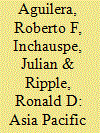

|
|
|
|
|
| Publication |
2014.
|
| Summary/Abstract |
Among natural gas producing nations, there has been some concern about how the Asia Pacific will meet future demand for energy. We argue that natural gas, both regional and global, will play a vital role. Estimates of potential gas consumption in the region are analyzed and used to develop consensus projections to 2030. These consumption profiles are compared with gas supply estimates including indigenous, pipeline and LNG for the Asia Pacific market. From this analytical framework, we find that demand will be sufficiently large to accommodate supplies from diverse sources including North America, the Middle East, Central Asia, Russia, and the Asia Pacific itself. An important policy implication is that gas producing and consuming nations should benefit from promoting gas trade and not be concerned about a situation of potential lack of demand coupled with oversupply.
|
|
|
|
|
|
|
|
|
|
|
|
|
|
|
|
| 2 |
ID:
094721
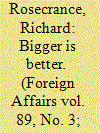

|
|
|
|
|
| Publication |
2010.
|
| Summary/Abstract |
After World War II, "trading states" seemed to be charting a new path forward. But small was not beautiful. Even great powers found themselves negotiating larger markets through economic associations with others. It's time the United States became such a power.
|
|
|
|
|
|
|
|
|
|
|
|
|
|
|
|
| 3 |
ID:
112813
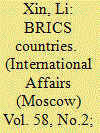

|
|
|
|
|
| Publication |
2012.
|
| Summary/Abstract |
THE MAN WHO COINED the acronym BRIC probably did not even imagine that it would later be filled with real content and would acquire viability. Indeed, the nations that became part of this association are located at the most different points of the planet - in Asia, Africa, Europe, and Latin America. Nevertheless, the development of the economic structures of the BRICS countries has brought about a diversification of the world economy and global market, previously focused mainly on the U.S. and Western countries. In the process of the reform of global economic governance, these countries stand on similar ground; they strengthen coordination of actions and cooperate with each other. These countries are at similar stages of development and tackle approximately the same tasks: economic growth, internal stability and social development. Their advantage lies in the fact that their economies are complementary, which provides a broad field for cooperation within the scope of one organization and with the rest of the world. It is safe to say that the BRICS countries are active supporters and practitioners of global partnership for development and a bridge for North-South dialogue and cooperation
|
|
|
|
|
|
|
|
|
|
|
|
|
|
|
|
| 4 |
ID:
150499
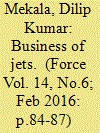

|
|
|
| 5 |
ID:
127575
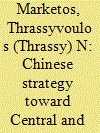

|
|
|
|
|
| Publication |
2012.
|
| Summary/Abstract |
As China's economy has grown and become integrated into the global market, both have become interdependent. Therefore China's long-term development goals will only be possible with increasing and stable access to foreign trade, resources, and energy. The latter has become a pressing issue as the country's dependence on international energy imports rapidly increases and might impose a limit on its growth if left unmet. This is especially important given supply shortages as a result of the recent events in Libya and given the future prospect of supply disruptions from the Middle East. In the case of oil, the International Energy Agency (IEA) forecast in 2010 that Chinese imports would grow from 4.3 million barrels a day (m/bd) in 2009 to 12.8 m/bd in 2035, thus rising from 53% to 84% of the total demand. The issue of resource shortages will play an even more prominent role in international relations and will become an increasing source of conflict among major powers. Given the fact that some countries are more generously endowed with strategic resources, this opens up the possibility of using these tools for political gain. Historically, economic diplomacy has contributed to the shifting balance of power in the world. Nations have more often been inclined to employ economic measures in pursuit of foreign policy objectives when "the legitimacy of the power of existing structures of international cooperation decreases." The result of the current realignment of geo-economic power will encourage nations to reassess the effectiveness of their energy, economic, and foreign policies.
|
|
|
|
|
|
|
|
|
|
|
|
|
|
|
|
| 6 |
ID:
124162
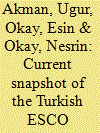

|
|
|
|
|
| Publication |
2013.
|
| Summary/Abstract |
Turkey's Energy Efficiency Law (EEL), enacted in 2007, had been expected to transform the energy policies in government and private sectors, and offer opportunities for, then-impending, Turkish Energy Service Company (ESCO) market. Yet, the communiqué of the EEL related to ESCOs was released only recently in July 2012. In this work, we review the current status of the ESCO market in Turkey. We provide an outlook through the recent legal communiqué and present barriers, enabling factors, and opportunities, supported by country's financial and economic facts. ESCO-financing mechanism prevailing and the sources of financing in the country are also mentioned. The communiqué on ESCOs fits well in the chain of regulatory attempts to increase Turkey's competitiveness in the global markets. However, we anticipate that some of its principles and procedures to be enforced may be deterrent for small-scale candidate ESCOs and may slow down the expected development of the Turkish ESCO market. Otherwise, the communiqué should lead restructuring of a stronger ESCO market in Turkey.
|
|
|
|
|
|
|
|
|
|
|
|
|
|
|
|
| 7 |
ID:
108191
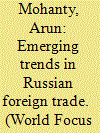

|
|
|
| 8 |
ID:
115870
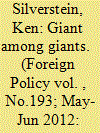

|
|
|
| 9 |
ID:
114495
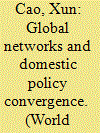

|
|
|
|
|
| Publication |
2012.
|
| Summary/Abstract |
National economies are embedded in complex networks such as trade, capital flows, and intergovernmental organizations (igos). These globalization forces impose differential impacts on national economies depending on a country's network positions. This article addresses the policy convergence-divergence debate by focusing on how networks at the international level affect domestic fiscal, monetary, and regulatory policies. The author presents two hypotheses: first, similarity in network positions induces convergence in domestic economic policies as a result of peer competitive pressure. Second, proximity in network positions facilitates policy learning and emulation, which result in policy convergence. The empirical analysis applies a latent-space model for relational/dyadic data and indicates that position similarity in the network of exports induces convergence in fiscal and regulatory policies; position similarity in the network of transnational portfolio investments induces convergence in fiscal policies; and position proximity in igo networks is consistently associated with policy convergence in fiscal, monetary, and regulatory policies.
|
|
|
|
|
|
|
|
|
|
|
|
|
|
|
|
| 10 |
ID:
093666
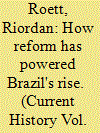

|
|
|
|
|
| Publication |
2010.
|
| Summary/Abstract |
After the military rule and the ineffectual civilian governments that the country endured from 1964 to 1994, Brazil has turned the corner.
|
|
|
|
|
|
|
|
|
|
|
|
|
|
|
|
| 11 |
ID:
109744
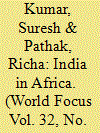

|
|
|
| 12 |
ID:
109793
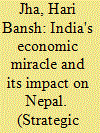

|
|
|
| 13 |
ID:
109105
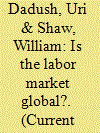

|
|
|
| 14 |
ID:
178099
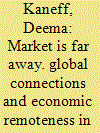

|
|
|
|
|
| Summary/Abstract |
This article examines the role of the ‘global market’ in the exacerbation of economic remoteness in rural Ukraine. Based on a case study of a UK-sponsored project that set up a sewing centre in a rural community in Odesa province, I explore how unequal access to the global economy is determined by the type of market sought and the type of product designated for production. The approach looks critically at ‘the market’—as both a Western-oriented ideological construct and set of practices—that serves to distance the community from centres of global economic importance, both in a temporal and spatial sense.
|
|
|
|
|
|
|
|
|
|
|
|
|
|
|
|
| 15 |
ID:
119908
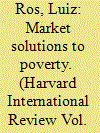

|
|
|
|
|
| Publication |
2012.
|
| Summary/Abstract |
A generation ago, Latin America and the Caribbean (LAC) was known for debt crises, military dictatorships, hyperinflation, and grinding poverty. Today, the region is characterized by regional political and economic integration, increased global market share for its exports, sound financial management, and declining unemployment. Most importantly, it is a region that has internalized its role in the world. Imbued with new choices and an independent voice, the region is emerging as the center of the South-South-East exchange of goods and financial capital between LAC, Africa, and China. It is time for the world to look at Latin America and the Caribbean in a new way.
|
|
|
|
|
|
|
|
|
|
|
|
|
|
|
|
| 16 |
ID:
155462
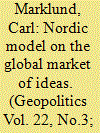

|
|
|
|
|
| Summary/Abstract |
This article analyses the contemporary deployment of the Nordic welfare state model as a centrepiece of Nordic competitive identity and strategic communication on the global market of ideas. First, it looks at the interrelated phenomena of global competition, competitive identity and region branding. Second, it studies the interplay between Nordic transnational public diplomacy and national public diplomacy of individual Nordic countries, in particular Sweden, on the one hand and international media outlets’ reporting on the Nordic countries on the other. In analysing this cross-fertilizing genre, the article identifies how the welfare state is being repackaged for export along with a set of “progressive values” which are coded as specifically “Nordic.” The article discusses (1) the interaction between outer images and inner visions; (2) the place and significance of the Nordic model, progressive values and the welfare state in today’s Nordic branding; and (3) the possible function of outward competitive identity as a kind of “compensatory imagination” directed inward as well as outward.
|
|
|
|
|
|
|
|
|
|
|
|
|
|
|
|
| 17 |
ID:
129045
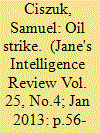

|
|
|
| 18 |
ID:
126969
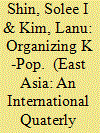

|
|
|
|
|
| Publication |
2013.
|
| Summary/Abstract |
This paper studies the connection between the emergence and market making activities of the large Korean entertainment houses and the global level success of "K-pop," an increasingly popular type of Korean popular music. We review a set of conventional explanations, respectively pointing to cultural factors, government support, and technological development as core factors that led to the global success of K-pop. We find all three explanations unsatisfactory and, alternatively, building on studies of market intermediaries, argue that the roles of three large entertainment houses-SM Entertainment, YG Entertainment, and JYP Entertainment-have been the most crucial in the development and success of K-pop. Through combining data from Korean music charts, newspaper articles, and revenue data, we trace the increasingly systematic musical production strategies of the entertainment houses and the macro-consequences of their organizational activities.
|
|
|
|
|
|
|
|
|
|
|
|
|
|
|
|
| 19 |
ID:
119685
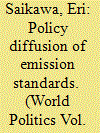

|
|
|
|
|
| Publication |
2013.
|
| Summary/Abstract |
In a dramatic example of policy diffusion, the past three decades have witnessed the spread of automobile emission standards throughout the world. Contrary to fears that global competition would produce a race to the bottom, there appears to be a race to the top, not only among rich countries but also among poor ones. Using econometric analysis of the adoption of automobile emission standards over the past twenty years for 129 countries, the author argues that this global diffusion results from countries' efforts to stay competitive in the international market. Due to the pressure from importing countries that have adopted stringent emission standards, even developing countries have rapidly moved to adopt rich country standards. The evidence shows that adoption of automobile emission standards correlates with an increase in the total value of automobile exports. Under some conditions, economic incentives in a global market can be a complement to environmental protection.
|
|
|
|
|
|
|
|
|
|
|
|
|
|
|
|
| 20 |
ID:
127394
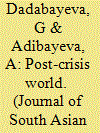

|
|
|
|
|
|
|
|